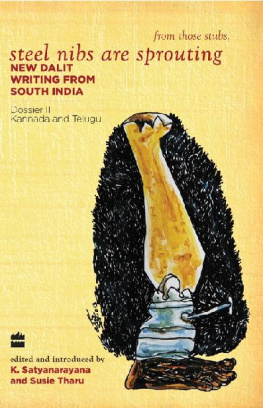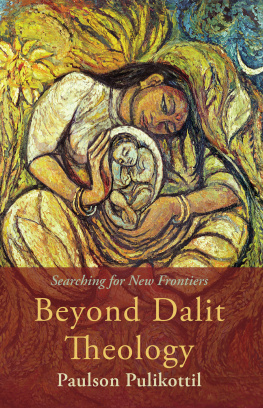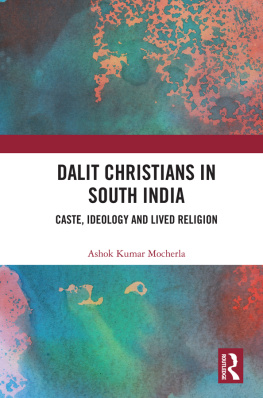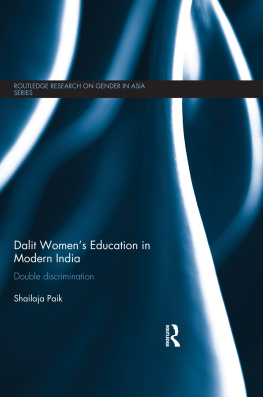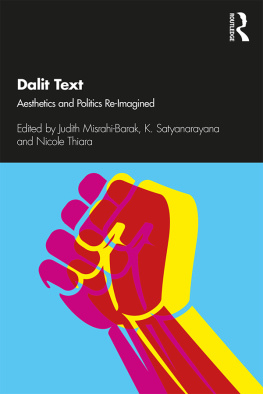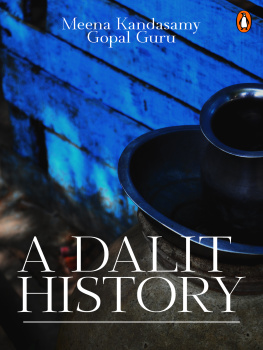from those stubs,
steel nibs are sprouting
NEW DALIT WRITING FROM
SOUTH INDIA
DOSSIER II: KANNADA AND TELUGU
Edited and Introduced by
K. SATYANARAYANA AND SUSIE THARU
HarperCollins Publishers India
Contents
ABSM | Arundathiyar Bandhu Seva Mandali |
ASA | Dr B.R. Ambedkar Students Association |
AYS | Ambedkar Yuvajana Sangham |
APCLC | Andhra Pradesh Civil Liberties Committee |
AISF | All India Students Federation |
BRP | Bahujan Republican Party |
BSP | Bahujan Samaj Party |
BJP | Bharatiya Janata Party |
CITU | Centre of Indian Trade Unions |
CPI (ML) | Communist Party of India (MarxistLeninist) |
DAFODAM | Democratic Action Forum for Dalits and Minorities |
DMS | Dalit Maha Sabha |
DSF | Dalit Students Federation |
DSS | Dalit Sangharsh Samiti |
DSU | Dalit Students Union |
KPSC | Karnataka Public Service Commission |
MISA | Maintenance of Internal Security Act |
MRHS | Madiga Misalati Horata Samiti |
MRPS | Madiga Reservation Porata Samiti |
OBC | Other Backward Classes |
PDSU | Progressive Democratic Students Union |
POW | Progressive Organization of Women |
PUC | Pre-University Course |
PW | Peoples War |
RCS | Raitu Coolie Sangham |
RSU | Radical Students Union |
RYL | Radical Youth League |
SC | Scheduled Caste |
ST | Scheduled Tribe |
SSLC | Secondary School Leaving Certificate |
SVF | Samata Volunteer Force |
SYS | Samajwadi Yuvajana Sabha |
TDP | Telugu Desam Party |
TRS | Telangana Rashtra Samiti |
VIRASAM | Viplava Rachayitala Sangham |
Most readers would know the story of Ekalavya, the legendary, self-taught, lower caste archer whose skills outshone those of Arjuna, the favoured student of the brahmin guru, Dronacharya. Talented and passionate about archery, Ekalavya longs to study with Dronacharya and seeks him out, but on learning of his caste, the guru rejects him. A disappointed Ekalavya returns to the forest, makes a clay model of the guru and proceeds to teach himself. Some years later, apprehensive about the extraordinary skills Ekalavya had developed, the guru asks him for the traditional fee due to a teacher. He makes only a modest request: Ekalavyas right thumb.
As Sikhamanis poem Steel Nibs are Sprouting suggests, thumb stub no longer symbolizes a shishyas respect for the guru. It stands for the law that externs dalits from the world of the arts, knowledge and power. The Dossier in your hand documents an upsurge, beginning in the last decades of the twentieth century, when those on the outside reject the role assigned to them in such stories, rename themselves, write of contemporary outsides and present-day insides, and set out their dreams for another world. Dossier I maps the intellectual and artistic moves that mark, as well as comprise, this event in Tamil and Malayalam. This second collection is from Kannada and Telugu.
We use the term dossier mindfully, for this is an open-ended collection. It brings together most of the key figures and founding texts and includes contributions from different regions and castes. The texts are literary, critical and analytical; on occasion when an appropriate or representative text was not available we have carried an interview. However, we are also happily conscious that the collection is not exhaustive. Movements such as these that reposition a people gather communities in new ways, and transform the discussion on an issuesometimes called epistemic breaksnecessarily involving hundreds of voices, a variety of forms and many different kinds of documents, of which only a few have been represented here. For example, although the songs of H. Janardhan, Gaddar, Gorati Venkanna or Pichchali Srinivas are mentioned many times in the texts and biographical headnotes, we have not even begun to grapple with the significance of a music that accessed living repositories of artistic skill and memory, gave these movements their passionate and imaginative reach, andas a by-productopened up a whole world of popular Indian music obscured by the authority of the classical forms.
We retain that open-ended format in this introductory essay as well. The account here of founding events and discussion of key issues is designed to supplement the texts and headnotes and be read alongside them. We flesh out incidents such as the boosa agitation that gave a new momentum to literary and political expression in Kannada, or the Karamchedu massacre around which the new discussion on caste emerged in Telugu. We take note of major organizations, such as the Dalit Sangharsh Samiti, Dalit Mahasabha and Madiga Dandora, that arise from those inaugural events and point to the literature and politics that they gave rise to. The specific ideological lineages (and the rich reworking of Ambedkar, Lohia, Gandhi and Marx) of each region as well as the cross-currents that connect them are traced, and some key questions that have emergedamong them the dalit woman question, the sub-caste movements, and their engagement with questions of culture and identityare explored.
Boosa, the Kannada Literary World and the DSS School
On or about December 1910, Virginia Woolf once proclaimed in a talk on the English novel, human character changed (Woolf 1924:5). The implications, she pointed out, are momentous: when such a shift takes place, there is at the same time a change in religion, conduct, politics, and literature (Ibid.: 11).
And so, she continued, the smashing and the crashing began. Thus it is that we hear all round us, in poems and novels and biographies, even in newspaper articles and essays, the sound of breaking and falling, crashing and destruction (Ibid.: 21). Given the reverence with which they are regarded today in literary circles, it might surprise us that James Joyce and T.S. Eliot are among the unruly iconoclasts that she names.
If we were to seek out a moment with similar scope in the Kannada-speaking world, it would be 19 November 1973. At a seminar on New Waves organized by the Dr Ambedkar School of Thought in Mysore, B. Basavalingappa, minister of town administration, is reported to have said something like: there is a great deal of boosa in Kannada literature. This handsome and always dapper minister had begun his talk by commenting on the demand that all education in the state should be in Kannada. We should have Kannada pride, speak Kannada, strive to make it grow; but we get ideas, independent thinking and patriotic feeling by reading English, he is reported to have said before he added the now historic comment about Kannada literature.

